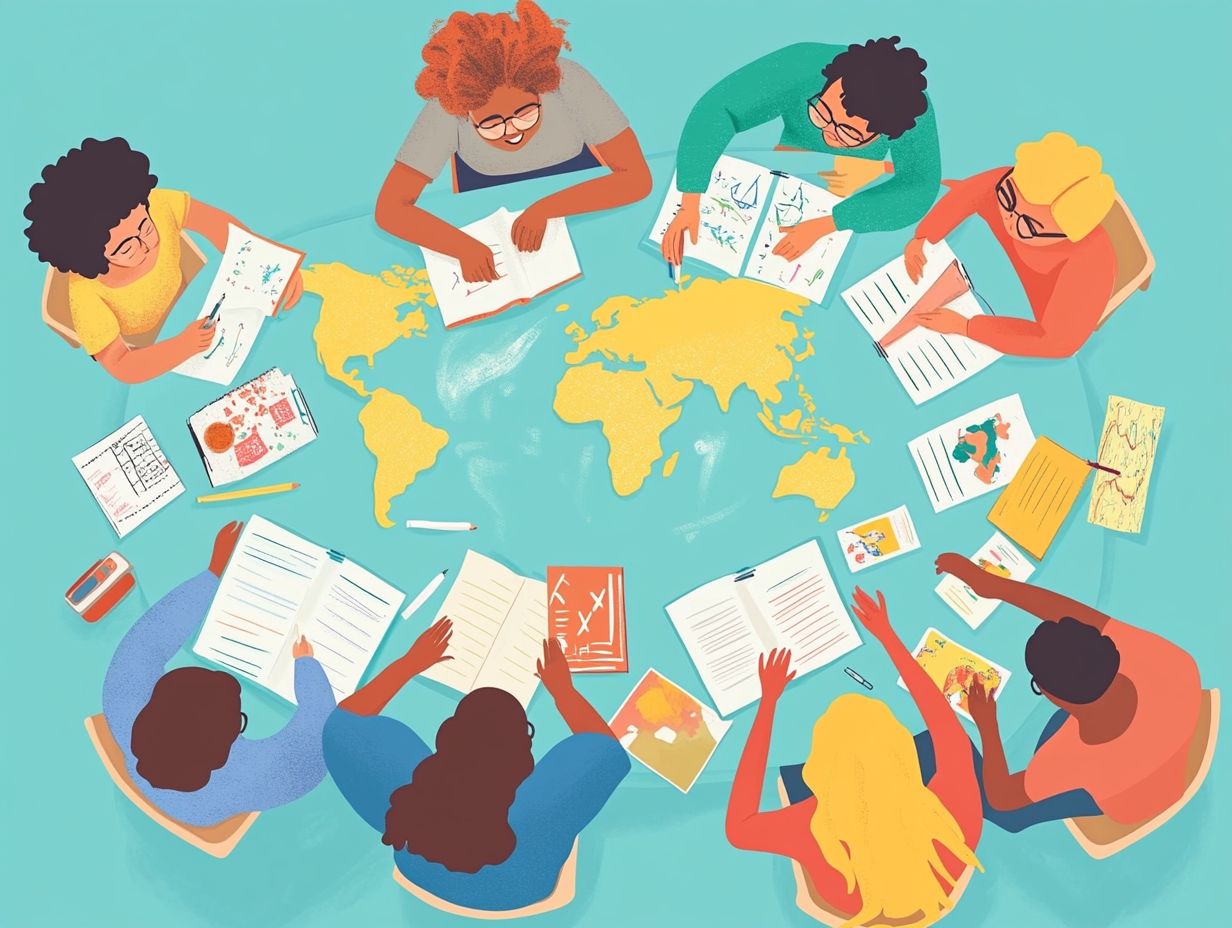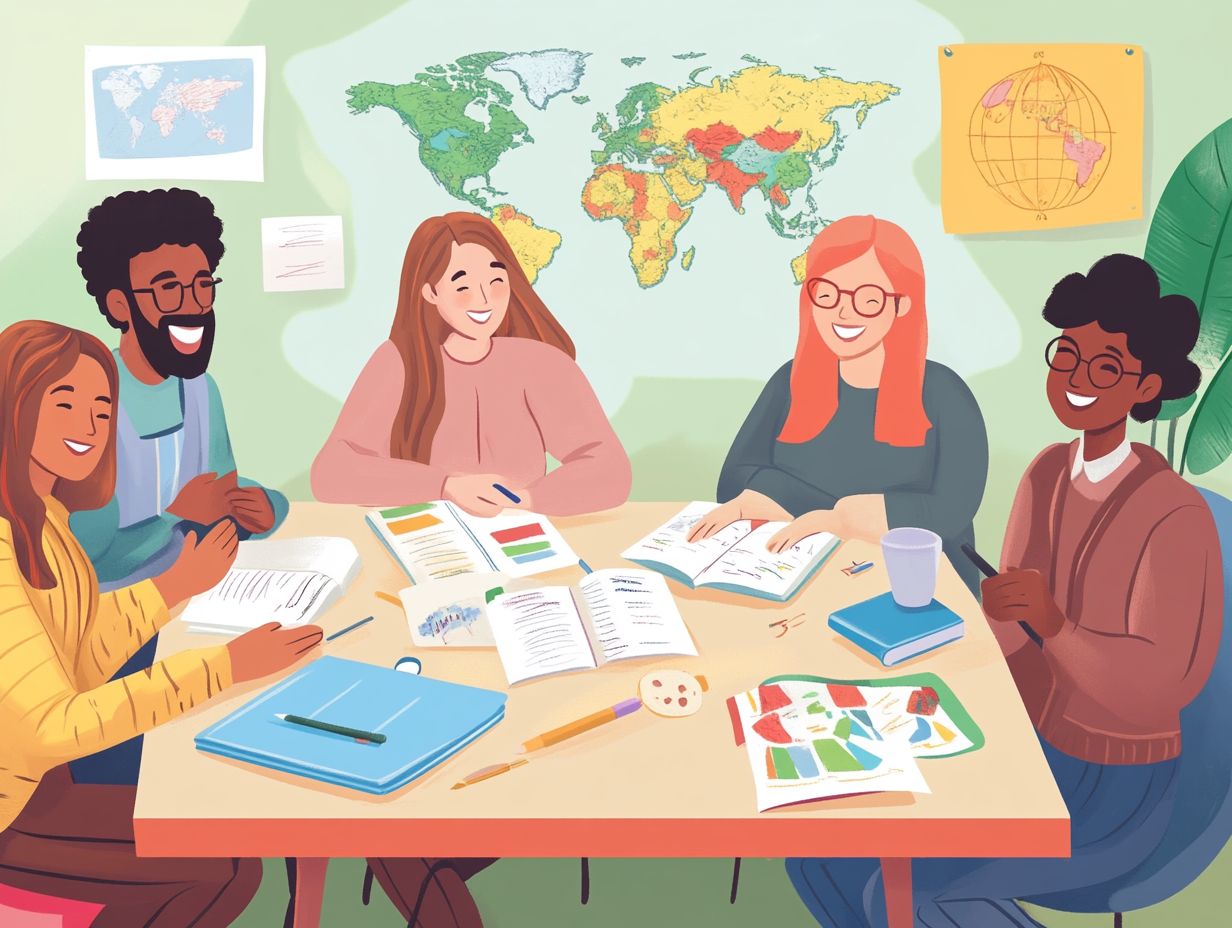Mastering a New Language: Key Strategies for Success
Learning a new language transcends being merely an impressive skill; it unlocks pathways to significant personal and career growth and a wealth of professional opportunities.
This article delves into the myriad benefits of language acquisition, helping you choose the right language tailored to your aspirations. It offers effective strategies to enrich your learning experience while tackling common challenges you may encounter on this journey.
Are you ready to dive into this exciting journey?
Contents
- Key Takeaways:
- The Importance of Learning a New Language
- Choosing the Right Language to Learn
- Effective Strategies for Learning a New Language
- Overcoming Common Challenges
- Utilizing Technology for Language Learning
- Practicing and Maintaining Fluency
- Frequently Asked Questions
- What is the best way to master a new language?
- How important is consistency in mastering a new language?
- Can immersion help in mastering a new language?
- How do realistic goals play a role in mastering a new language?
- Is it important to practice speaking and listening in addition to reading and writing?
- How long does it take to master a new language?
Key Takeaways:

- Learning a new language has numerous benefits for personal and professional growth.
- Think about what excites you and how a language can open new doors in your life!
- Immersion, practice, and utilizing technology are effective strategies for mastering a new language.
The Importance of Learning a New Language
Learning a new language transcends mere academic pursuit; it serves as a gateway to significant personal and career growth. This journey opens doors to new cultures, enhances your communication skills, and fosters thinking skills. It gives you the power to engage more deeply with diverse communities while expanding your vocabulary and comprehension.
Mastering a foreign language also enriches your understanding of cultural nuances, leading to more meaningful social interactions and broadening your perspectives. As your proficiency grows, your ability to navigate different contexts transforms this skill into a valuable asset that contributes to both career advancements and personal fulfillment.
Benefits for Personal and Professional Growth
The benefits of learning a new language go well beyond communication; they play a crucial role in enhancing your personal and professional life. This multifaceted ability sharpens your cognitive faculties, making you more adept at problem-solving and critical thinking while simultaneously unlocking a wealth of job opportunities in our interconnected world.
Professionals who know multiple languages often shine in competitive fields like international business, tourism, and diplomacy, significantly boosting their employability and chances for advancement. Moreover, engaging with diverse cultures fosters meaningful connections and enriches your personal experiences, leading to a deeper understanding and appreciation of different perspectives.
Ultimately, embarking on the journey of language acquisition can be transformative, paving the way for both personal growth and professional success.
Choosing the Right Language to Learn
Choosing the right language to learn is a significant decision that demands careful consideration of various factors. Personal interests, cultural connections, and professional goals should all play a vital role in guiding your choice.
This thoughtful approach enhances your motivation and transforms the learning experience into something truly engaging and purposeful.
Factors to Consider and Popular Choices
When you re contemplating which language to learn, several factors come into play, including your personal interests, the language’s relevance to your career, and your connections to specific cultures.
In today s interconnected world, languages like Spanish and Mandarin often top the charts, thanks to their high demand across various industries. If you re looking to boost your marketability, mastering these languages could very well unlock doors to international business opportunities and enriching cultural exchanges.
Moreover, personal ties to a heritage can add meaningful layers to your learning journey, making the experience practical and profoundly rewarding. It s also wise to consider how easy a language is to learn; languages that closely resemble your native tongue can expedite the acquisition process, further enhancing your professional and cultural engagement.
Start your language learning journey today and unlock a world of opportunities!
Effective Strategies for Learning a New Language

To master a new language effectively, you need to embrace a blend of strategies and techniques that promote immersion, ensure consistent practice, and invite constructive feedback. This all-in approach will enhance your vocabulary retention and deepen your comprehension, setting you on a path to fluency.
Immersion, Practice, and Other Techniques
Immersion and consistent practice stand out as two of the most effective techniques in language learning. They enhance your engagement through real-life applications and interactive experiences.
These strategies help you grasp vocabulary and grammar. They also cultivate your listening and speaking skills in a dynamic environment. Participating in language exchanges can deepen your understanding, as you share cultural insights while refining your conversational abilities.
Traveling to regions where your target language is spoken opens up a world of authentic interactions, breathing life into the language itself. Utilizing media think films, podcasts, and music in your target language immerses you in various dialects and colloquialisms, reinforcing your vocabulary retention and fluency in enjoyable, relatable contexts.
Overcoming Common Challenges
Navigating the common challenges of language learning like the frustration from making mistakes and hitting performance plateaus is crucial for your continued growth and motivation on the path to skilled language use.
By addressing these hurdles head-on, you can sustain your journey and keep your passion for mastering a new language alive.
Tips for Dealing with Frustration and Plateaus
Dealing with frustration and plateaus is a common part of your language learning journey. However, there are effective strategies to help you navigate these challenging phases.
By breaking down larger skills into smaller, manageable goals, you can celebrate those incremental achievements that keep your motivation alive. Seeking constructive feedback from instructors or peers offers fresh perspectives, allowing you to identify potential mistakes that may have slipped under your radar.
Diversifying your resources is another invaluable strategy. Incorporating podcasts, films, or language exchange platforms keeps the process engaging and deepens your understanding. Embracing setbacks as opportunities for growth reinforces your resilience and determination in mastering a new language.
Utilizing Technology for Language Learning
In today’s digital landscape, leveraging technology for language learning has emerged as a profoundly effective strategy. You have access to an array of innovative apps and resources crafted to streamline your language acquisition journey.
Best Apps and Resources for Language Acquisition

You ll find a wealth of apps and resources designed to enhance every aspect of language acquisition. This makes it easier than ever for you to dive into a new language with confidence!
Imagine interactive platforms that employ gamification to keep you motivated, alongside comprehensive databases packed with detailed grammar and vocabulary exercises. These tools present a diverse array of learning methods tailored to your style.
Many applications now boast voice recognition technology, enabling you to practice pronunciation and receive real-time feedback a game changer for truly mastering a new language.
Some resources even include community features, allowing you to connect with native speakers for authentic conversation practice, significantly boosting your fluency and comprehension.
By exploring these options, you can customize your learning journey to align perfectly with your personal preferences and linguistic ambitions.
Practicing and Maintaining Fluency
Practicing and maintaining fluency in a new language demands consistent strategies that foster ongoing engagement and retention both vital for achieving long-term success.
Start your language learning journey today!
Strategies for Keeping Up with a Language
To maintain your fluency in a language, effective strategies are essential. Practice regularly to keep your skills sharp.
Join language clubs to engage in conversations with peers. Setting specific goals, like learning a few new words each week, can boost your motivation.
Use spaced repetition tools to supercharge your vocabulary! These tools help you remember words better over time.
Engage in cultural activities, watch movies, or read literature in your target language. This approach makes learning fun and keeps your interest alive.
Frequently Asked Questions
What is the best way to master a new language?
Success in mastering a new language relies on consistent practice, immersion, and setting realistic goals.
How important is consistency in mastering a new language?
Consistency is crucial. It leads to steady improvement in language skills. Aim to practice daily or multiple times a week.
Can immersion help in mastering a new language?
Yes! Immersion can greatly aid in mastering a language. This can happen by studying abroad, living in a country where the language is spoken, or surrounding yourself with native speakers.
How do realistic goals play a role in mastering a new language?
Setting realistic goals keeps you motivated and on track. Focus on specific, attainable objectives, like learning a certain number of vocabulary words or engaging in basic conversations.
Is it important to practice speaking and listening in addition to reading and writing?
Absolutely! Speaking and listening are essential for effective communication. Make sure to practice these skills alongside reading and writing.
How long does it take to master a new language?
The time to master a new language varies by individual. It depends on factors like the language’s complexity, practice time, and immersion. With dedication, you can expect improvement within a few months to a year.






